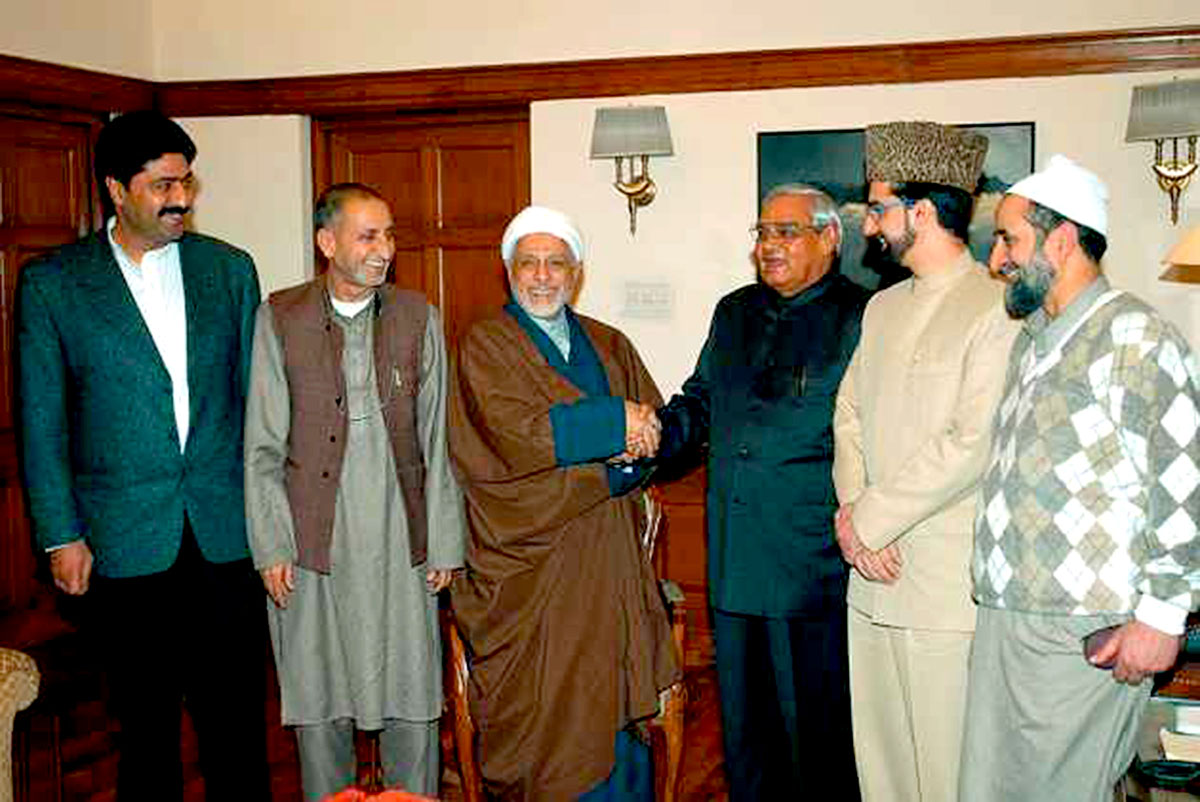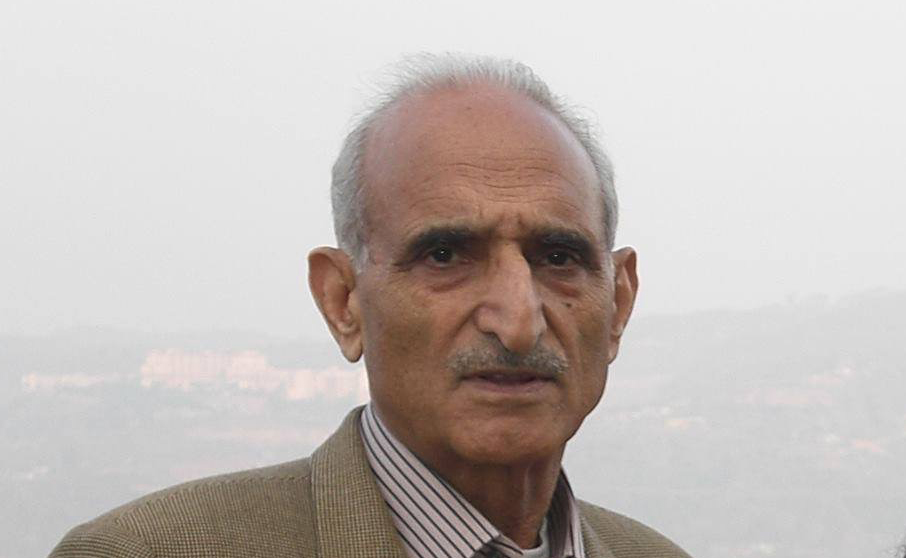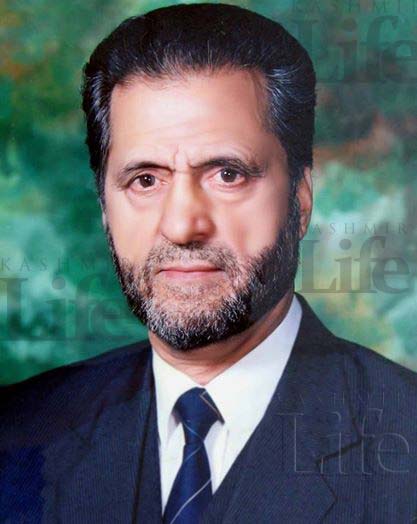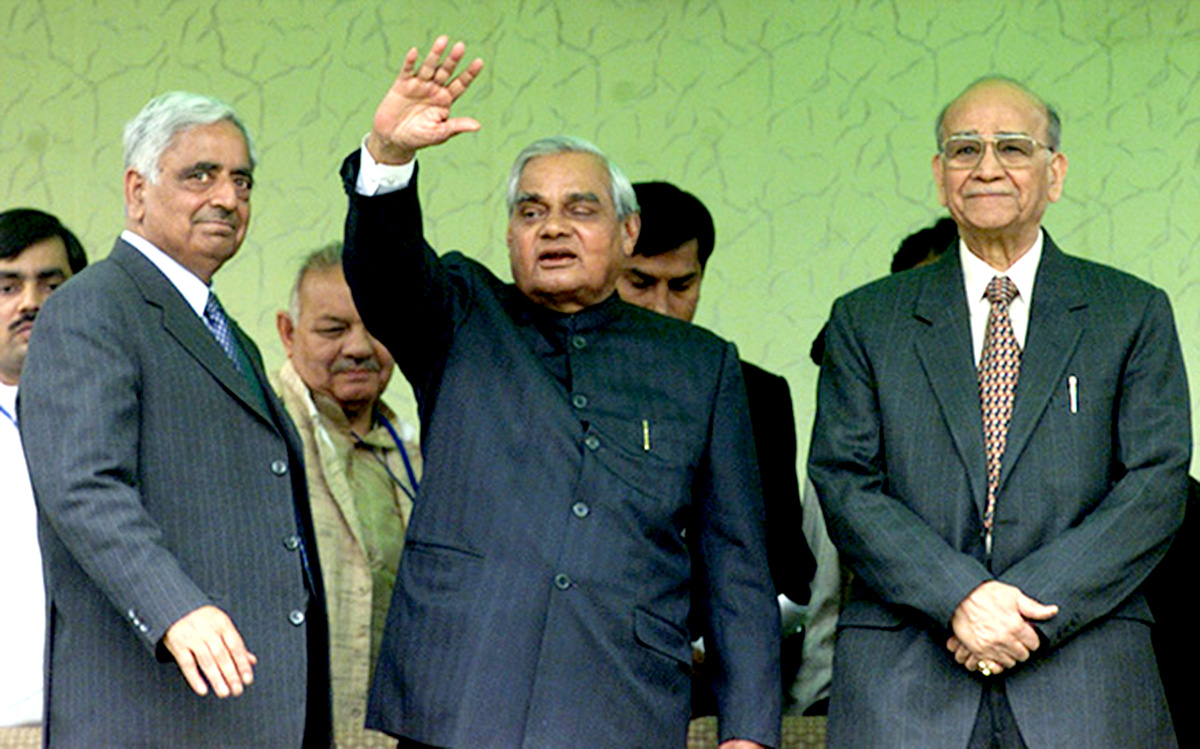While most of his initiatives as Prime Minister are well documented, Masood Hussain offers rare details – some appearing for the first time, about Atal Behari Vajpayee, the hard Sanghi who was soft towards Kashmir, a place he knew closely since 1953, perhaps much better than any Parivaar member will ever know

With the death of Atal Behari Vajpayee, the Sangh Parivaar has lost its last ‘peacemaker’ who lived in a secular packaging for most of his life. In him, even Kashmir lost a pair of most important ears that had, historically, heard the voices of logic, reason and history, people who know Vajpayee in Kashmir said. While most of the reportage about Vajpayee’s Kashmir involvement revolves around his era as the Prime Minister, the fact is that he was involved on Kashmir ‘front’ for a very long time.
Vajpayee as the young Sangh activist had accompanied Dr Syama Prasad Mookerji in 1953 to Kashmir. A watershed event in Kashmir history, Mookerji had come to protest the exclusivity of Kashmir in the Indian federation. Then, the Sangh slogan was Eak Pradhan, Eak Nishan, Eak Vidhan. Sheikh Abdullah arrested Mookerji , kept him in a Nishat house where he died. Sangh termed it custodial murder and it eventually contributed to Sheikh’s humiliating dismissal as Prime Minister and arrest.
A frequent visitor to Kashmir, various people in Srinagar had seen him pillion riding on a scooter and doing party work. “He was a personal friend of Dr Jalalulddin, the cardiologist and I would see him quite often there,” a resident of Pampore said. “Most of the time, there was no security to him.”
But Vajpayee’s first major public appearance was somewhere in 1967 or 1968 when as leader of the Jana Sangh, he was supposed to deliver a public speech in Srinagar’s Sher-e-Kashmir Park. The programme had been announced by Tika Lal Tiploo (killed by militants on September 14, 1989), the Sangh’s leader in Kashmir, operating from Haba Kadal, then the main address of the Kashmiri Pandits.
Prof Syed M Afzal Qadri, who retired as a faculty in the law department of the University of Kashmir, was then a student of the SP College. “It was later in the afternoon that the news broke in the college that Taploo has got some Vajpayee to the Sher-e-Kashmir Park for a speech and it triggered a reaction,” Qadri remembers. “It took a bit of time for a few hundred students to assemble and then the procession started.”
Qadri remembers that the procession – not initiated by the Plebiscite Front though – was shouting slogans in favour of the referendum and was fiercely against the Jana Sangh. That hate against Jana Sangh had two vital factors. Firstly, the Parivaar opposed the idea of special provisions that Kashmir enjoyed post-accession and its bitter opposition led to the sacking of Sheikh, one of the towering leaders of the Vale. Secondly, the Jana Sangh had a very communal face in Kashmir, Balraj Madhok, who lived in Kashmir, fled to Jammu in 1947, and literally gave birth to the new Jana Sangh that had most of its politics rooted in Kashmir.

“We reached the spot and very close to it we saw the audience comprising mostly of Kashmiri Pandits,” Qadri said. “As the students attempted getting into the park to disturb the meeting, it ended into a clash.” The students resorted to stone pelting. “It disturbed the entire meeting and the audience fled,” Qadri said. “Then the leaders on the stage were targeted and we were told that Vajpayee survived with an injury in his leg.” Police came into action, chased the students away and rescued the leaders including Vajpayee.
But that attack did not deter Vajpayee from speaking. He walked to the Orion Hotel in Lal Chowk and an emergency press conference was organised on its top floor. Mohammad Sayeed Malik, then a young reporter, covered that presser.
“He explained why he is in Kashmir,” Malik said. “He said we want to meet people and get them closer to the people in India because I do not see any reason between the two parties to look at each other with suspicion.” Malik remembers his sentence: “Aghar Shikayat Hein Tou Hum Bhi Apni Awaz Mila Dain Gay” – ‘if there are complaints, we will lend our voice to it too’. “Vajpayee said they are not in Kashmir for politics.”
Vajpayee’s attitude towards Kashmir never changed. This was impressive because he had a Kashmiri speaking person at home. “He understood Kashmir and despite the ideological limitations that his Parivaar had, he always talked about the wide room that existed to accommodate all,” Malik said. “He had a conviction and courage to say it too.”

Post-emergency, India changed. It was Jana Sangh propelled anti-emergency political voices, which created Janata Party that managed to get power in 1977 polls. By then, Congress had rehabilitated Sheikh Abdullah in Kashmir and restored him his throne in 1975. But when the emergency was declared by Indira Gandhi, it was extended to Jammu and Kashmir as well and Sheikh resorted to massive arrests of Jamat-e-Islami in Kashmir.
Janata Party had an appeal in Kashmir too. All of a sudden, a section of non-Congress, non-NC people started finding a space in the Janata Party. Vajpayee had already become the External Affairs Minister and started working overtime in Kashmir.
“I remember one small meeting that Vajpayee presided over in the Broadway Hotel,” PDP’s former minister, then an information department employee said. “It was around the spot where the hotelier later set up the swimming pool.” Malik, the Director of Information, was also there. “He (Vajpayee) had invited Sheikh Abdullah as well. He was out of power as Congress had withdrawn support to him and the state was under President’s rule,” Malik said. “He addressed Sheikh Sahab in the meeting, saying, ‘Hum Sab Nay Apnay Ashiyanay Jala Diyay Hain, Chaloo Hum Haath Milanein’ – ‘we all have burnt our boats, let us join hands’.”
Later that year, Jammu and Kashmir went to polls after Delhi made it public that it will not permit any rigged election. This public commitment helped all the anti-NC forces get reactivated: Moulana Mohammad Sayeed Masoodi was the main leader of the Janata era; Mirwaiz Mohammad Farooq was the most prominent ally; Abdul Gani Lone was also around and Jamat-e-Islami also contested polls.
“Prime Minister Morarji Desai’s visit to Mirwaiz Manzil was a watershed event and it took place in June 1977, days ahead of the polling,” Manzoor Unjum, editor Uqaab, said. “Then, there was no Nalla Maar road and the Mirwaiz Manzil was connected with Rajouri Kadal road by a small culvert.”
Desai and his team that probably had Vajpayee as well, came to the Mirwaiz Manzil amid an unprecedented welcome, that for the first time, had a lot of women also. “He was with Mirwaiz for around 90 minutes and he sat on the same chair on which, earlier, Qaid-e-Azam, Ali Mohammad Jinnah had sat,” Unjum said. “When he left, the women broke into the chorus. They famously sang the wanwun – Sabz Dastarus Khudah Choie Raazi – Pakistanuk Gazi Aou. While leaving the Mirwaiz Manzil, he walked till the road and then boarded his car.”

Sheikh being a reluctant Congress ally, even after the loss of power, Janata Party wanted to see him defeated. But the free and fair elections, perhaps for the first time after 1947, fetched Sheikh a stable government. The National Conference (NC) won 47 out of 76 seats in the state assembly – 40 of them from Kashmir. Janata Party won 13 seats – only two from Kashmir – Abdul Rashid Kabuli (Eidgah) and Abdul Gani Lone (Handwara). Jamat-e-Islami got five seats. Kabuli became the Janata Party’s legislative party leader. “Mirwaiz had fielded another candidate but he lost to the NC,” Unjum said.
Kabuli, one of the oldest political workers who worked very closely with the Sangh, has now retired. The memories of his association with Vajpayee are still fresh, however. “Vajpayee was respected and he knew the riffraff that made his party, so he would always ensure they do not cross the line, the Lakshman Rekha,” Kabuli said. “He was very responsive to what Kashmir required. One day, I visited him when he was foreign minister informing him that people in Kashmir have to travel to Delhi to file an application for a passport. He immediately sanctioned a passport office to Srinagar which is still working.”
Kabuli as Legislative Party Leader in state assembly would meet the Janata leaders quite often, and later, when he returned to NC and became the Member of Parliament, he would spend days with him in the Lok Sabha. He said he was aware of the meetings that he had with the Kashmir separatists. “That was not a dialogue because the last dialogue took place between Afzal Beig and Parthasarathy, nothing after that,” Kabuli said. “You go to the Prime Minister and tell him to release this and that man does not make a dialogue at all. I know things but I cannot reveal who was suggesting what. Vajpayee would ask me about individuals seeking appointments.”
The most important thing that Kabuli revealed was that Vajpayee was “unhappy with NC and Congress” and was repeatedly insisting that the two parties have “destroyed” Kashmir. “Not once but many times he asked me that I should get in and create a party but I always maintained that I lack capacity and resources and I do not want it,” Kabuli said. “I believe, it was the same offer that Mufti Mohammad Sayeed later availed and created his PDP.” Was that the reason that the part went lock, stock and barrel to pay their respects to the departed Bishmpidama of Indian politics?
Kabuli said Vajpayee was serious on Kashmir and wanted to be remembered by history as a peacemaker. “Pakistan, especially Musharaf humiliated him and that made him a laughing stock in the Parivaar,” Kabuli said. “Later when he was trying to get some solace for the survivors of Godhra, Modi rebuffed him and that pushed Vajpayee to the bed.”

It is public knowledge though that Vajpayee’s rubble rousing speech on the eve of the demolition of the Babri Masjid in December 1992, was a key factor in creating a mess that eventually led to Godhra in 2002. “There were sharp stones that came out, no one can sit there,” Vajpayee had famously said while telling a jubilant audience that they have been waiting for a long time to sit in Ayodhya. “The ground has to be levelled; it has to be made fit for sitting.” He had been accused of making a similar speech in Nillie in November 1983 when his anti-Muslim diatribe led to the butchery of nearly eight thousand Muslims in seven Assam villages within 24 hours.
But Kashmir being different, Vajpayee always saw it in its historical context, or, as Kabuli said as “a completely separate and distinct culture”, unlike the entire Parivaar. As Prime Minister, Vajpayee’s initiatives are well documented, but not all of them.
“Vajpayee was indulgent towards Kashmir,” Dr Haseeb Drabu, the man who inked the BJP-PDP deal for Mufti Sayeed in 2015 winter, said. “While his troika of Insaniyat, Jumhooriyat and Kashmiriyat was more of atmospherics, even as it set the framework for a possible approach, it was evident in smaller cases that I personally know.” He had accompanied Mufti when the latter went to see Vajpayee, after the accord but found him “barely alive”. They had breakfast with his adopted daughter, instead, and flew home for oath-taking.
Drabu was personally involved on three occasions with Vajpayee as the Prime Minister. “The first came within days when we were drafting the plan and I evaluated that Jammu and Kashmir needs Rs 2500 crore,” Drabu said. “As I finalised the requirement, I was conveyed that the Prime Minister wants Rs 2600 crore. When I said the state does not require, I was rebuffed and overruled but finally, the Chief Minister wrote a letter, thanking Vajpayee for being gracious but kept the figure at Rs 2500 crore.” As the file reached Vajpayee, he summoned him. “He understood my logic and then said, let us have all the Rs 2600 crore spent on your terms,” Drabu said.

The second was a slightly critical one. Jammu and Kashmir, for a very long time, was not getting any multi-lateral funding coming to India through World Bank. For any multi-lateral funding, both India and Pakistan are supposed to formally sign a paper declaring that the funding will have no bearing on the disputed status of the Jammu and Kashmir as it existed in 1947 summer. “We processed the case and the Asian Development Bank agreed to give us Rs 4000 crore under the post-conflict fund,” Drabu said. “As it reached the PMO, it was blocked. India was opposing the same grant to the Pakistani side and Pakistan was insisting that since the conflict is still going on, why ADB should advance a post-conflict fund?”
The crisis landed Darbu flanking his Chief Minister to the PMO. Vajpayee offered double the sum outside ADB. “I said, Sir, we do not need this money for the sake of resource, we seek it because the World Bank funding comes with the systems that we want to build and he felt convinced,” Drabu said. “The next moment, he picked up the phone and told Yeshwant Sinha to sign it. The benefit was shared by J&K and PaK just by his nod.” Muzaffarabad got more than Rs 2500 crore.
The third episode involved the Baglihar that was suffering time and cost overruns. It needed Rs 642 crore of viability gap funding. “The request had been sent by the Chief Minister and it was rejected by power ministry and later by the finance ministry,” Drabu said. “Finally, it was Vajpayee that overruled all and got this resource that helped the Baglihar to come up.”
Vajpayee had one quality, people who knew him say: he would never forget people. Kabuli apart, there were many people who would be invited to meet and discuss Kashmir informally with the Prime Minister. “After Abdul Gani Lone flew back from Washington, he had a lot of ideas to talk about,” Mohammad Sayeed Malik said. “He wanted to share the ideas with Vajpayee and it was my editor R K Mishra who arranged all those meetings.”
Malik said Lone would drive in one car to his Observer office and from there he would move in a different private car, just to maintain some sort of secrecy to what he was doing. He later went to Pakistan and Vajpayee knew every bit of it. When he flew home, he was killed. Vajpayee had visited Kashmir many times as Prime Minister but his visit in May 2002, was overshadowed by the assassination.
In his statement that was distributed to the media persons, Vajpayee termed Lone “a respected figure, a great son of Kashmir and spirited champion of Kashmiriyat”. Lone, he said, was gunned down by the “enemies of peace” because of his “courageous voice against gun culture, a voice that was beginning to get more and more influential”. For formal “talks” with Hurriyat took off much later.















